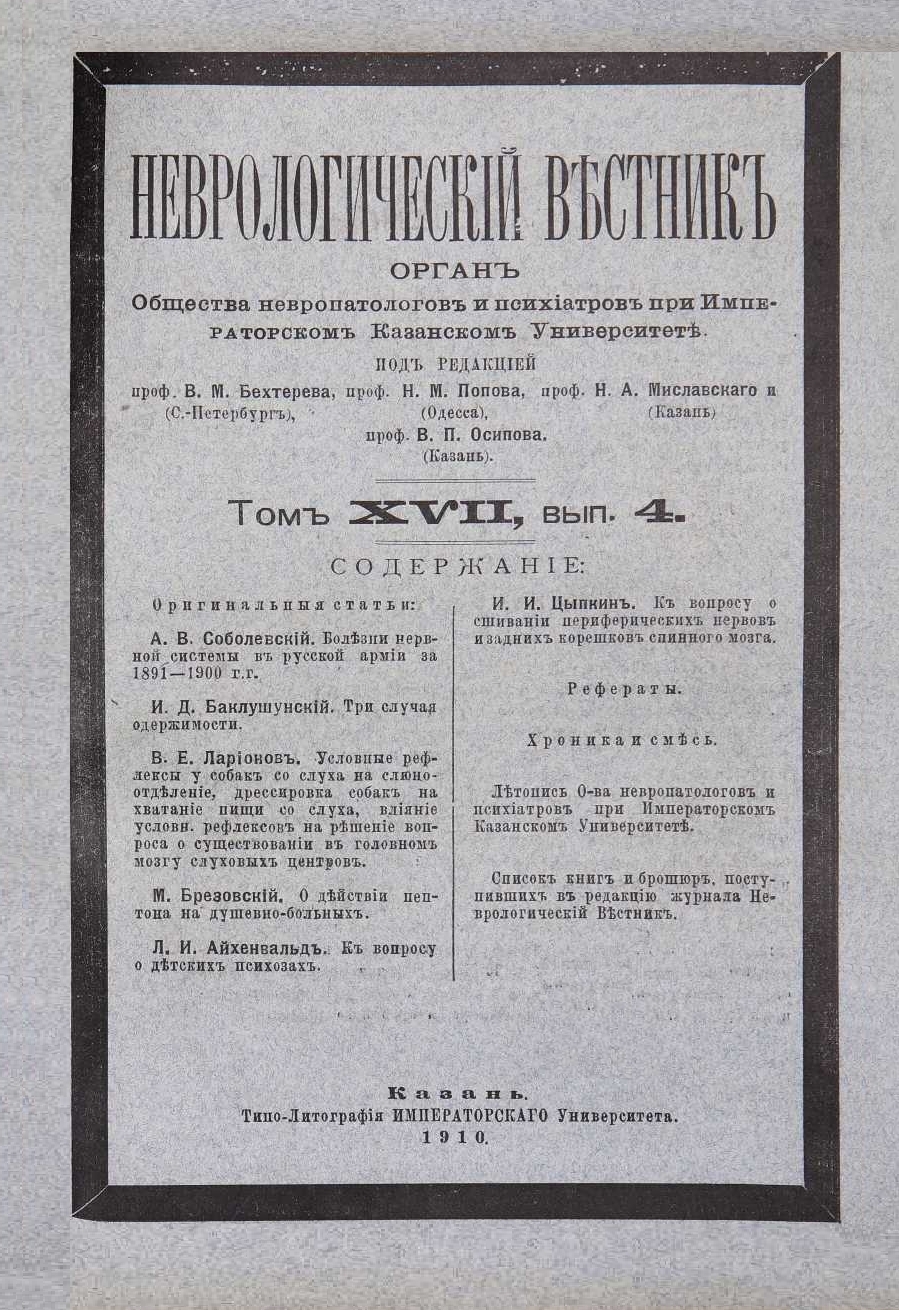A. L. Mendelson. The current state of the issue of the treatment of alcoholism by suggestion. - Russian. Doctor 1910 № 31, 32
- Authors: Baklushinsky I.D.
- Issue: Vol XVII, No 4 (1910)
- Pages: 883-884
- Section: Abstracts
- Submitted: 11.03.2022
- Accepted: 11.03.2022
- Published: 15.11.1910
- URL: https://journals.eco-vector.com/1027-4898/article/view/104738
- DOI: https://doi.org/10.17816/nb104738
- ID: 104738
Cite item
Full Text
Abstract
An irresistible craving for alcohol, according to the author, is the result of mental anomalies: weak will, painful irritability and impressionability of mood swings, in the form of periods of mental depression, etc. Therefore, it is natural to expect that mental treatment will be no less appropriate here than when using mentally -sick. The best results in this regard are obtained by occasional drunkenness, based on the patient's weakness, in the absence of sharp alcoholic changes in the body and psyche, the worst results are typical binge drinking, which is essentially due to periodic psychosis. On the basis of 3500 cases, the author argues that only alcoholism on the basis of severe mental illness is not amenable to treatment by suggestion. An indispensable condition for the success of our treatment should be the sincere desire of the drinker himself to give up drunkenness and undergo treatment, subject to complete abstinence from all alcoholic beverages. Otherwise, the alcoholic needs bed rest and vigorous general treatment. As regards the method of producing suggestion, here the author does not adhere to the calculus. certain rules, advising the use of one or another type of suggestion (with deep hypnosis, its mild degree, suggestion in a waking state), depending on the individual characteristics of the patient. Their frequency: the first suggestion daily, or every other day, then two days later, then less and less. In the 2nd half of the year, in successful cases, 1 session per month is enough.
Keywords
Full Text
Неодолимое влеченіе къ алкоголю, по мысли автора, есть результатъ аномалій психики: слабоволія, болѣзненной раздражительности и впечатлительности колебаній настроенія, въ видѣ періодовъ душевной угнетенности и т. п. Поэтому естественно ожидать, что психическое лѣченіе здѣсь окажется не менѣе умѣстнымъ, чѣмъ при пользованіи душевно-больныхъ. Наилучшіе результаты въ этомъ отношеніи даетъ случайное пьянство, основанное на слабоволіи больного, при отсутствіи рѣзкихъ алкогольныхъ измѣненій организма и психики, наихудшіе—типичный запой, обусловленный въ сущности періодическимъ психозомъ. На основаніи 3500 случаевъ, авторъ утверждаетъ, что лишь алкоголизмъ на почвѣ выраженной душевной болѣзни не поддается лѣченію внушеніемъ. Непремѣннымъ условіемъ успѣшности нашего лѣченіе должно быть искреннее желаніе самого потатора броситъ пьянство и подвергнуться леченію при условіи полнаго воздержанія отъ всякихъ спиртныхъ напитковъ. Въ противномъ случаѣ, алкоголикъ нуждается въ постельномъ режимѣ и энергичномъ общемъ леченіи. Что касается методики производства внушенія, то здѣсь авторъ не держится к. л. опредѣленныхъ правилъ, совѣтуя примѣнять тотъ или другой видъ внушенія (при глубокомъ гипнозѣ, легкія степени его, внушеніе въ бодрственномъ состояніи), смотря по индивидуальнымъ особенностямъ больного. Частота ихъ: первыя внушенія ежедневно, или черезъ день, потомъ черезъ два дня, затѣмъ все рѣже и рѣже. Во 2-е полугодіе въ удачныхъ случаяхъ—достаточно по 1 сеансу въ мѣсяцъ.
About the authors
Ivan D. Baklushinsky
Author for correspondence.
Email: info@eco-vector.com
Russian Federation
References
Supplementary files







